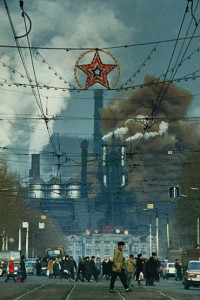While Sunday’s “People’s Climate March” is being described as the largest climate protest event of all time with organizers claiming over 310,000 participants in New York City, the more radical protesters saved their skills for Monday’s “Flood Wall Street” protest. Around 1000 protesters spent the day trying to get in the way in and about Wall Street. At the end of the day over 100 of the protesters were arrested. That’s a 10% arrest rate, a pretty good ratio for any protest :-). Darrell Delamaide writing for USA Today says:
One of the speakers at Monday’s protest, Canadian journalist Naomi Klein, has cast the debate over climate change as a clash between “deregulated capitalism” and the welfare of mankind in her new book, This Changes Everything: Capitalism vs. the Climate, which was published last week.
“We have not done the things that are necessary to lower emissions because those things fundamentally conflict with deregulated capitalism,” she writes in the book, “the reigning ideology for the entire period we have been struggling to find a way out of this crisis.”
On Tuesday Leonardo DiCaprio addressed the UN Climate Summit saying: “We need to end the free ride that industrial polluters have been given in the name of a free-market economy, they don’t deserve our tax dollars, they deserve our scrutiny. For the economy itself will die if our ecosystems collapse.”
Ms. Klein and Mr. DiCaprio are mistakingly laying the blame for pollution, and by implication climate change, at the foot of the free-market economy. Some waste and pollution are the outgrowth of economic activity. Pollution is not caused by a free-market economy, pollution is the result of production. The question we must ask, is which economic system best accounts for and minimizes pollution.
It has been 25 years since the collapse of the Berlin Wall symbolized the collapse of communism. How soon we forget the levels of pollution that were accepted in the command economies of Eastern Europe and the Soviet Union. While almost no one (I assume neither Ms. Klein nor Mr. DiCaprio) is advocating for return to the political economy of rigid command economies of the last century, by decrying the free-market system we are unwittingly moving in that direction. Writing in The Federalist Colin Grabow reminds us:
When the Berlin Wall came down and the Iron Curtain was finally lifted to expose the inner workings of communism to Western eyes, one of the more shocking discoveries was the nightmarish scale of environmental destruction. The statistics for East Germany alone tell a horrific tale: at the time of its reunification with West Germany an estimated 42 percent of moving water and 24 percent of still waters were so polluted that they could not be used to process drinking water, almost half of the country’s lakes were considered dead or dying and unable to sustain fish or other forms of life, and only one-third of industrial sewage along with half of domestic sewage received treatment.
The pollution record of command economies is much worse than that of free-market economies. The economic aspect of the problem of pollution is essentially a lack of defined property rights. The closer a system is to common ownership the closer that system will be to the “tragedy of the commons”. Free Market Environmentalism (FME) “is an approach to environmental problems that focuses on improving environmental quality using property rights and markets.” Ms. Klein and Mr. DiCaprio would be better suited looking for a decentralized solution for pollution rather than pointing us in the direction of more intrusive government. They would both be better served to read Free Market Environmentalism – second edition is due out in the near future.

 Bert Wheeler
Bert Wheeler
 Jeff Haymond
Jeff Haymond
 Marc Clauson
Marc Clauson
 Mark Caleb Smith
Mark Caleb Smith
 Tom Mach
Tom Mach